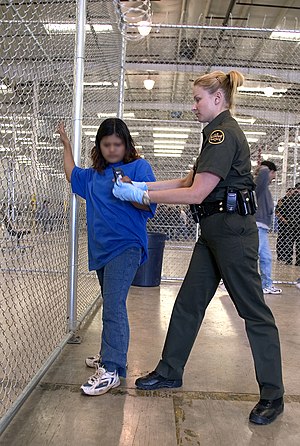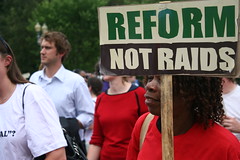By Paul Canning
An American immigration program which quickly deports undocumented immigrants from states like Arizona has been quietly shelved.
‘Stipulated removal’ removed thousands of people but because of flaws in how it was carried out, disregarding people’s rights, the program has effectively ended. Ninety-six percent of those removed under the program did not have a lawyer,; the program was stopped for those without counsel. Immigration officials have not deported a single illegal immigrant through the program in Arizona in over a year, Vincent Picard, a spokesman for Immigration and Customs Enforcement (ICE) in Phoenix
told the Arizona Republic.
In September 2010 a federal appellate court ruled that the rights of an immigrant held in the
Eloy detention center in Arizona were violated. After that, speedy removals were offered only to illegal immigrants with lawyers who could help them fight their cases.
With ‘Stipulated removal’, an immigrant gives up the right to a hearing and the right to an appeal. It is supposed to save time and money.
But
a report released in September by the National Immigration Law Center accused officials of pressuring for quick deportation by threatening long detention stays and failing to provide adequate interpretation and translation.
Most – 80 percent – of those deported through the program hadn’t committed crimes.
“DHS agents administering the program provided legally inaccurate portrayals of the opportunities to remain in the United States in order to boost deportation numbers, even though judges and others involved in the program voiced their concerns about how the program short-circuited individuals’ rights,” the report says.
In one of the documents the report’s authors obtained through an FOI request, they found a Spanish-language script, apparently used by agents administrating the program, to convince immigrants to sign the stipulated order of removal. The script, replete with grammatical errors and legal inaccuracies, erroneously informs immigrants that the “only” way to “fix” their papers is through certain family relationships and openly discourages immigrants from taking their cases to court.
“This report confirms what attorneys working in detention centers have heard for years: non-citizens, especially those with limited English skills, are pressured into signing documents without being informed of the severe consequences of their actions,” said Karen Tumlin, managing attorney at the National Immigration Law Center and co-author of the report.
Undisclosed: potential permission to remain in US
Undocumented immigrants may have a right to remain, such as if they have lived in America for a long period of time, have no criminal record and have children born in the country.
Instead of deportation, the non-criminals also may have qualified for less-severe voluntary departure, which gives immigrants the chance to return to the US if they qualify for a green card, said Tumlin. Instead, by accepting ‘stipulated removal’, immigrants are generally barred from coming back to the U.S. for as long as 10 years and face felony charges for illegally re-entering the country.
Phillip Crawford, a former field director for ICE’s enforcement and removal operations in Arizona,
told the Arizona Republic that it is a shame that the program had been curtailed.
He claimed it had several levels of “safeguards” to ensure that rights were protected and that participants understood what they were signing. Each case was reviewed by ICE officers during processing at detention centers, by ICE prosecutors and by an immigration judge who has the power to reject the deportation if the judge believed the immigrant had legal grounds to remain.
In September 2010, the 9th U.S. Circuit Court of Appeals ruled that immigration officials at Eloy had violated the rights of Isaac Ramos. Ramos, an undocumented immigrant from Mexico with prior criminal convictions, had agreed to stipulated removal while being detained in Eloy in 2006. The court ruled that the government failed to make clear to Ramos that he was giving up his right to talk to a lawyer, who could have explained the process and the penalties. The court also ruled that the immigration judge who signed Ramos’ deportation order failed to determine if Ramos had agreed to stipulated removal “voluntarily, knowingly and intelligently,” as required.
Ramos, who is married to a legal permanent resident and has two U.S.-citizen children, had argued that he should be allowed to return to the U.S. since his rights to due process were violated. The court, however, denied that request.
Arizona now has a system called “prompt hearings.”
At a hearing anyone facing deportation is advised of their full array of rights and an Immigration judge confirms that they are aware of any possibility to legally remain in America.



















 Join our page
Join our page

